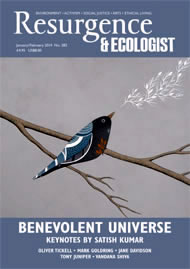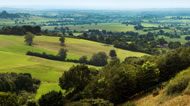There are many arguments against farming animals for meat and dairy products, not least that reducing livestock numbers would massively decrease greenhouse-gas emissions and deforestation, but the fact remains that even if we all became vegetarians overnight, many would continue eating milk, cheese and butter. Organic farming and the free-range dairy initiative do much to allay concerns over animal welfare, but still, whether we like it or not (and many do not), the trend in the UK is that farms are becoming bigger and more mechanised. As the numbers of cows increases on the farm, there is the thorny issue of slurry, which is fast becoming one of the most serious problems in agriculture today. So the launch of an initiative that not only solves the increasingly pressing problem of what to do with all this effluent, but also utilises it in a way that creates an energy source that can power the farm and dairy and produce a nitrogen-rich, odour-free fertiliser in the process, is a kind of miracle.
Enter the new Anaerobic Digestion (AD) plant at Wyke Farms, which reduces carbon dioxide emissions by a colossal 4 million kilos, as 75,000 tonnes of farm waste gets turned into green energy every year. This initiative is the culmination of five years of planning by the Clothier family, who have been making cheese at their farm in Somerset since 1861.
It sounds simple: the cows eat the grass and produce milk and manure. The milk is made into butter and cheese and the manure is fed into the AD, where it creates methane gas, which is piped to a generator and converted into electricity and heat, which then powers the dairy and the cheese factory, and any excess energy is fed into the national grid. The ‘digestate’ from the AD goes back on the fields as fertiliser, and is not only high in nitrogen but also contains no pathogens and has no smell. Anyone who lives in the countryside will appreciate this last benefit as the odour of slurry-spreading is an unwelcome and unhealthy nuisance.
It may sound simple but the technology involved is highly sophisticated. The three digesters are huge structures with a capacity of 4,600m3 each. £10 million worth of investment has gone into this closed-loop agricultural project. This closed loop of energy at Wyke Farms is the cornerstone of a process that produces 14,000 tonnes of Cheddar cheese per year.
This is a family-owned business with sustainability at its heart. Richard Clothier says: “I have seen that our 100% green commitment is yielding cost savings and efficiencies which in turn will make our business fit for the future, as well as improve the environment that we live in. Many of these savings are only possible to achieve through sustainable practice.”
Wyke Farms have turned one of dairy farming’s biggest problems into a solution, which proves that there is no such thing as waste – just resources in the wrong place.
AD technology has come a long way in the last 10 years and the Clothier family has seen the potential and taken a leap into the future. They want to “create a truly symbiotic relationship with the countryside that provides our food, our income and our home” and they are travelling towards this goal knowing that there is always more to be done: so water reclamation and solar energy are also on their agenda. As they say, “this is a journey, not a destination!”








